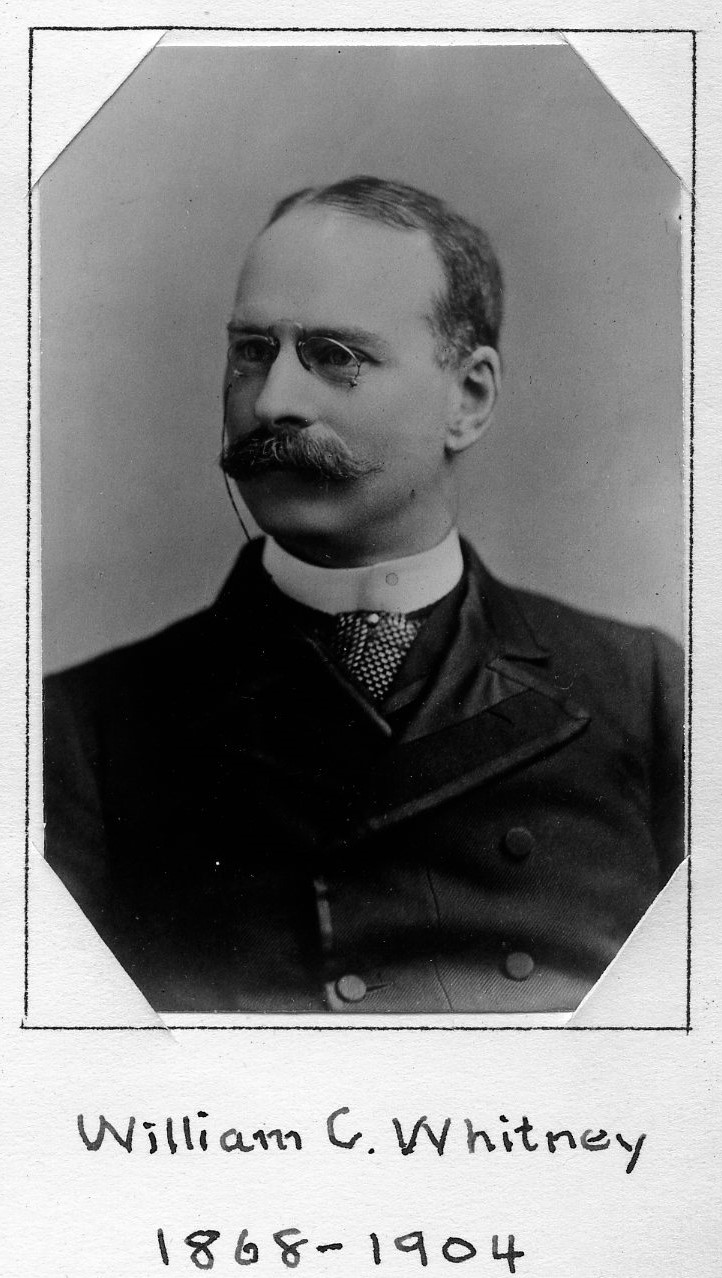Financier/Public Servant
Centurion, 1868–1904
Born 5 July 1841 in Conway, Massachusetts
Died 2 February 1904 in New York (Manhattan), New York
Buried Woodlawn Cemetery , Bronx, New York
, Bronx, New York
Proposed by Joseph H. Choate and William J. Hoppin
Elected 5 December 1868 at age twenty-seven
Proposer of:
Seconder of:
Century Memorial
William Collins Whitney was but five years out of Yale College, and three years from Harvard Law School, when, in 1868, he was elected to The Century. He was not yet thirty, and was “Will” Whitney to a considerable circle in the Club, the survivors among whom recall him as “the most winning and lovable of friends,” and withal as possessing a peculiar physical beauty of a type not common among Americans. He had first entered upon the practice of law with the late Judge Abraham R. Lawrence. He had much skill and energy and resource in his profession, and rapidly built up a practice in which large corporations were his clients, and in which his acute business judgment and his gift for the management of men and affairs were as important as his knowledge of law. He early engaged in politics, with a strong predilection to the Democratic side. It was in his blood, his father, a Massachusetts man, having been chosen for important offices by President Pierce and President Buchanan. Young Whitney’s first active part in public affairs was in the fight against the Tweed Ring, in which he formed a creditable and effectual association with Mr. Tilden, to whom his acute intelligence and foresight were especially attractive. After the downfall of the Ring, he allied himself with the County Democracy, and in 1875, he was appointed to the office of Corporation Counsel, which he held continuously for nearly eight years. He found the office overwhelmed with the defense of claims against the city, several thousand in number—“the driftwood of Ring times,” as he subsequently described them. He started with the “presumption that everything was fraudulent,” and when he resigned the office in 1882, he had cleared them, almost without exception, from the way. It was a laborious and valuable service, and he had a right to look forward at its close to the resumption of his private practice for an indefinite period. But the campaign of 1884, with its peculiar issues and the novel chance of undisputed victory for his party for the first time in a quarter of a century, made an appeal to him he could not resist. His summons to President Cleveland’s Cabinet was the natural sequence of his remarkably efficient party service. He accepted the appointment as Secretary of the Navy, to which department Congress had finally devoted appropriations sufficient for constructive work. Though the youngest man in the administration, it is no exaggeration to say that his achievement in it was the most important of the next four years. Secretary Whitney laid firm and broad the foundations on which a really great superstructure was erected, and determined standards and methods that have since been maintained and developed. When he left, the country had a real navy, and the assurance of a powerful one. On his retirement Mr. Whitney engaged in the development of urban passenger roads, of which the Metropolitan street railway system is the chief example, and in kindred enterprises, in which he acquired a large fortune. He did not return to politics, save for the campaign of 1892, to the success of his party in which he contributed invaluable aid and direction inspired by rare unselfishness, and for a brief interval, in 1896, when he made a desperate effort to save his party from the disaster he foresaw, and from what he regarded as disgrace, worse than disaster. In later years he gradually withdrew from the large business interests with which he was connected, and devoted his time to his racing stables, to the acquisition of rare and beautiful works of art, with which his unique mansion was filled, and to the care and embellishment of his large estate in the Adirondacks, in the South, and elsewhere.
He died suddenly on February 2d of last year, leaving a host of friends sincerely mourning what seemed his untimely end.
Edward Cary
1905 Century Association Yearbook

